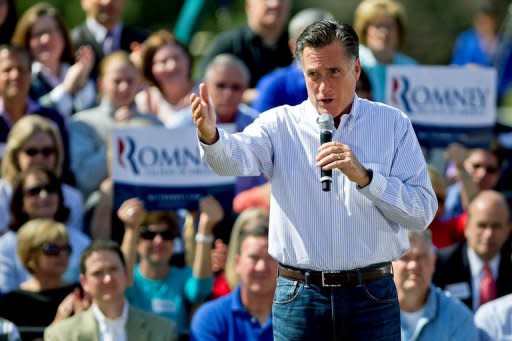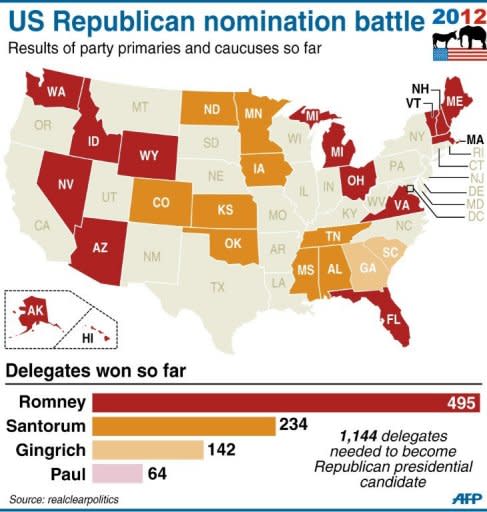Romney faces tough US slog to Republican nod
Republican frontrunner Mitt Romney faces a tough battle to become the party's White House contender after rival Rick Santorum cemented his position as the conservative alternative with double wins in the Deep South. While Romney has a commanding lead halfway through the state-by-state nominating process which began in January, his failure to seal the deal with the party's core conservatives has exposed an underlying weakness. It also seriously undermines claims that Romney is the Republicans' best shot at beating President Barack Obama in the November elections. The "fratricidal" Republican primary process is also providing Obama's Democrats with plenty of fodder to win over independents in key battleground states, said political expert Rogers Smith. "If the national economy is doing poorly the Republican candidate may well win, but there's little question that if that's not the case the Republican selection process will probably end up having benefited Obama," Smith, from the University of Pennsylvania, told AFP. A Pew poll released Wednesday showed Obama with a 12-point advantage over Romney in a national match-up and a whopping 18-point lead over Santorum. The battle to win over the Republican conservative base has re-ignited America's divisive culture wars over issues such as abortion, something which has helped Santorum but could hurt Republicans come November 6. "Party donors and insiders dread a Santorum candidacy as likely to lead to a 300+ electoral vote Obama blow-out," conservative pundit David Frum wrote on the Daily Beast on Wednesday. "The Santorum candidacy pushes Republicans toward an election in which the issues are religious, cultural, and sexual, not economic." Santorum's dramatic come-from-behind victories in southern Alabama and Mississippi on Tuesday will keep social issues high on the agenda and continue to pull Romney to the right, analysts said. It has also renewed pressure on former House speaker and southern native Newt Gingrich to bow out of the race, as the two states were seen as must-wins for his flagging campaign. Gingrich has won only two contests held in states and territories so far, but has accumulated an estimated 139 delegates due to proportional electoral distribution. It takes 1,144 delegates to clinch the nomination, but Republicans have historically picked their standard-bearer long before that number is reached. Santorum has 239 delegates and has come out on top in nine contests while Romney's 19 wins helped him collect 495 delegates, according to CNN's estimates of the complex delegate distribution process. Gingrich has vowed to slug it out all the way to the Republican convention in August, when the nominee is set to be crowned. "He wants to make life miserable for Romney as long as he can," said Steffen Schmidt, a political expert at Iowa State University. "Dropping out for Gingrich would be a humiliation, undermine his consulting business model, and leave him irrelevant in the Republican Party. He has to be the fighter all the way." While a Gingrich withdrawal would certainly help Santorum, polling data shows Romney would also gain from a two-man race, said Charles Franklin co-founder of pollster.com and a professor at Marquette University Law School. "The delegate advantage still weighs heavily in Romney's long-term favor," Franklin told AFP. "If there were a groundswell of support, an aroused electorate that moves strongly in one direction could in principle overcome the delegate challenge." But that would require a major shift in states without the strong presence of religious conservatives and remains a "long shot," Franklin said. Romney's team in a campaign memo pointed out that wins in Hawaii and American Samoa's caucuses meant their candidate would gain 41 delegates in total, compared to Santorum's 35, from Tuesday's contests. But Santorum insisted the double win only brought the former Pennsylvania senator closer to the "date of mathematical elimination." "It's pretty sad when all you have is to do math instead of trying to go out there and win it on substance and what Americans want to talk about," Santorum told CNN at a campaign stop in Puerto Rico. "I suspect that if we keep winning state after state after state we'll be the nominee." The focus of the race will shortly turn to Obama's home state of Illinois, a midwestern industrial state where Romney is currently leading in the polls. A Santorum victory there on Tuesday could prove a much more significant upset than in states dominated by religious conservatives. Voters will also cast ballots in Missouri on Saturday -- where Santorum won a 'beauty contest' held in February -- and in Puerto Rico on Sunday.




